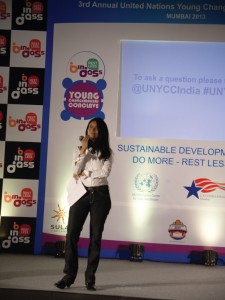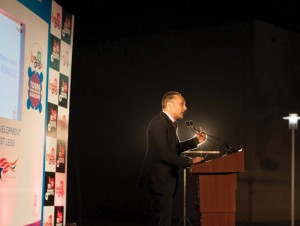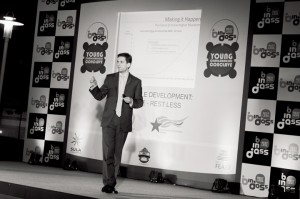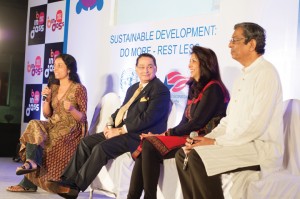Youth Inc gives you the scoop on what was discussed at the third Young Changemakers Conclave in Mumbai this year
 Since its inception in 2010, the Young Changemakers Conclave has been a platform for young citizens to meet and listen to the ideas of leaders from various fields including business, education, social activism, law enforcement and literature. The conclave this year was the third edition organised by United Nations Information Center for India and Bhutan. It was held in Mumbai on 25th January and was curated by Samyak Chakrabarty.
Since its inception in 2010, the Young Changemakers Conclave has been a platform for young citizens to meet and listen to the ideas of leaders from various fields including business, education, social activism, law enforcement and literature. The conclave this year was the third edition organised by United Nations Information Center for India and Bhutan. It was held in Mumbai on 25th January and was curated by Samyak Chakrabarty.
This year saw a dignified group of speakers take to the stage to address the young delegates on the theme of Sustainable Development: Do More – Rest Less. The group of speakers included a list of people from a wide variety of industries who could be termed as leaders because of their revolutionary approach to their industry and for bringing about a certain positive change through their words and actions.
Here are our favourite take-backs from what the leaders had to say
Panel of Entrepreneurs
Pratap Bose
COO, DDB Mudra
He said that starting up an entrepreneurship is a matter of a person’s DNA. He believes it is only the risk taker who will put their neck out and start a new business.
Rahul Akerkar
Founder and MD, deGustibus Hospitality
He said that his personal experience has taught him that being an entrepreneur can be about investing a lot of time in trial and error where you learn along the way and sacrifice a lot of your time in living, breathing and sleeping with what you are doing.
Sasha Mirchandani
Sasha Co-Founder, Mumbai Angels
He has been backing up start-up entrepreneurs with angel funding for years and said that it is important for the person to be passionate. The person should be ready to leave the security of a steady job and salary to dedicate all their time to their start-up because it is only then that they will do whatever it takes to get the job done.
Dr Satyapal Singh
Commissioner of Police, Mumbai
The Commissioner of Police amusingly mentioned that journalists are free to comment on whatever they feel like but police are criticised. When addressing a question regarding moral policing, he agreed that archaic laws should have no place in current society but also said that policemen can only implement laws and the law makers are the ones who should make the changes. He also said that police who are recruited from smaller towns are sensitised through workshops
when they are assigned to work in big cities to break the cultural divide.
 Rahul Bose
Rahul Bose
Founder, The Foundation
In addressing the not-for-profit sector, Rahul Bose said scale and sustainability are most important. He shared a personal experience of donating a utility vehicle to one of the islands in the Andaman and Nicobar Islands when he was told by the village chief that people usually say they would return to help but his organisation was the only one that kept its word and the act of kindness really touched the hearts of the chief and villagers.
Zarina Mehta
Managing Trustee, Swades Foundation
Ms Mehta provided a new definition for sustainability by describing it as the right of all living things to flourish. She also said that sustainability means to value, maintain and celebrate the rich diversity of all living things.
Gregory David Roberts
Author, Shantaram
The famous author highlighted the need for ethics in the business world. He shared an interesting story of rival companies Adidas and Puma who originated in a little known village in Germany. The rivalry between the companies resulted in the village being torn into two factions based on loyalties to the companies. When he was assigned the task of re-branding Puma, he suggested ending the feud which was accomplished by the two companies hosting a friendly football match after 65 years of enmity. He stated that companies should have friendly relations to share resources for growth and sustainable development.
 William H Avery
William H Avery
Author, China’s Nightmare, America’s Dream: India as the next Global Power
Wi l l Avery stated that 12 crore of India’s population is at university age at present but only two crore of this population is currently enrolled in higher education istitutes. He highlighted the fact that top universities in the world have allowed everyone to access their course study material by placing it online and that Indian institutes should follow suit to empower the less privileged.
Panel Discussion on Education
Moderated by
Shaheen Mitri, CEO, Teach For India
Prof NW Shivdasani
Principal, Jai Hind College
He said education is a very significant tool for sustainability and that educators should question the current boundaries up to which they can provide empowerment.
 Dr Indu Shahani
Dr Indu Shahani
Sheriff of Mumbai & Dean, HR College
She claimed that the role of education is to sensitise the privileged to the world of the underprivileged which is around it. She stated that education began with a simple mantra of ‘Classrooms to careers’ but has moved towards a different mantra which is ‘Classrooms to careers to communities’.
FR Frazer Mascarenhas
Principal, St. Xavier’s College
He said that we should change our lifestyle and claimed that the youth needs to change the paradigm and think in oppositional ways. They should question why mangroves are to be cut down to make way for a new airport instead of reducing the number of flights to preserve the ecology.
Volume 2 Issue 9


























